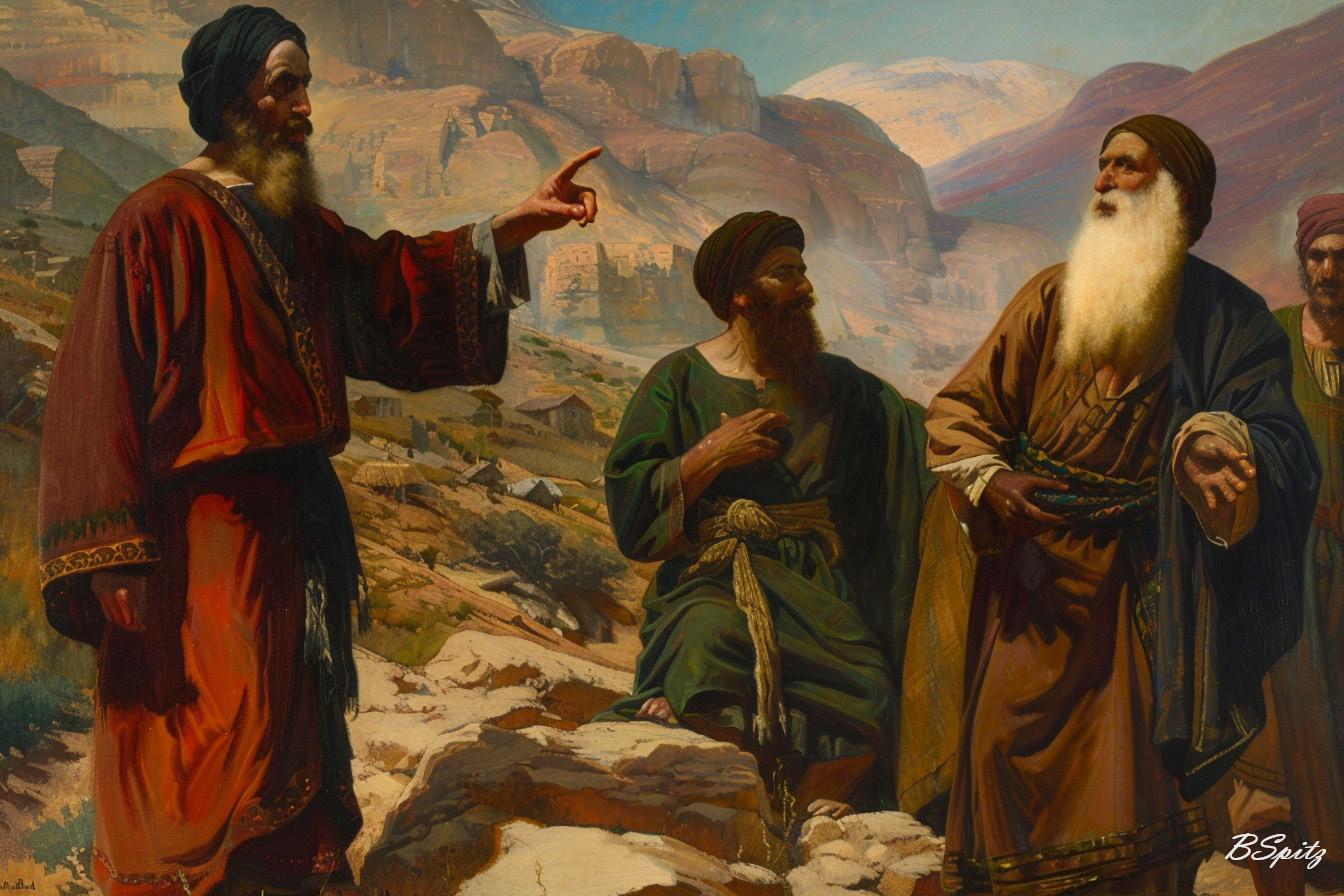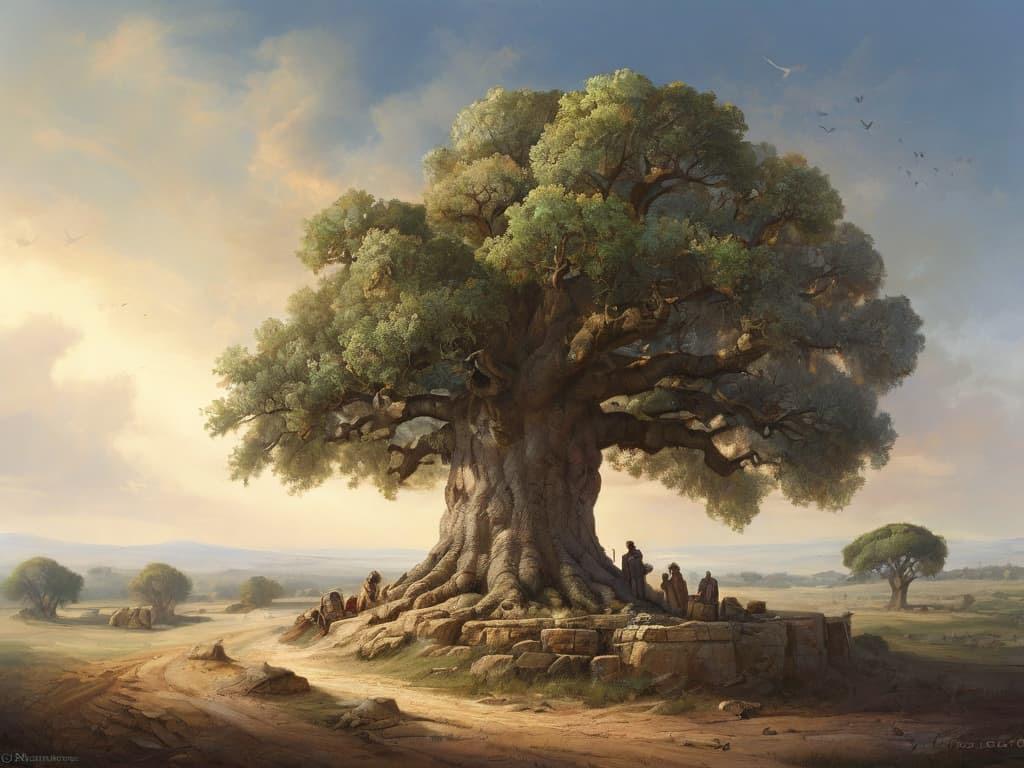


Must Our Leaders Be Popular?

























RABBI AARON ZIMMER & RABBI ELIE FEDER PHD Science’s 3 proofs of God
RABBI REUVEN MANN Korach’s revolt: a lesson in respecting Torah authority
RABBI MOSHE BEN-CHAIM God’s “5 possessions” point us to why we exist
RABBI BERNIE FOX
The Spies and Korach’s rebellion
“With abundant speech sin will not cease; and one who restrains his lips is wise” (Proverbs 10:19).
Are both abundant speech and silence the “causes” of sin and wisdom respectively, or are they merely symptoms of the sinner and the wise person? Both are true. One who speaks too much excites his emotions and causes sin. At the same time, speech is an outlet for one's emotions, and one who speaks much reveals his abundant emotions, and his evil leanings. Conversely, one who controls his speech withdraws from exciting his emotions through expressing his feelings. And his silence is indicative of his nature, to observe more than to talk; his mind is more active and he is wise. us, one who speaks much is already more emotional than others, and his speech drives further sin. While the silent person displays his nature of thinking more than talking, and he avoids the pi all of instinctual excitement through speech.

AARON ZIMMER & RABBI ELIE FEDER PHD www.PhysicstoGod.com



3 Proofs of God from Science
One way to see the substantial nature of these proofs is by considering scientists’ primary alternative - the multiverse. Since many modern-day scientists don’t accept the possibility of God, they reject the scientific indications of an intelligent cause and instead posit the existence of infinitely many unobservable parallel universes, each having di erent laws of nature. We’ll address the multiverse theory later.


Relationship Between Fundamental Physics, The Constants of Nature, and a Theory of Everything
Three ideas lie at the heart of the fine tuning argument: (i) fundamental; (ii) constants of nature; and (iii) theory of everything.
i) The term fundamental is used to describe the most basic entities that can’t be reduced to anything else. Specifically, fundamental physics is the study of the deepest principles of nature which are ultimately responsible for all the complexity and diversity in chemistry, biology, astronomy, and all the other sciences. Modern physics conceives of the world as being composed of fundamental particles and fundamental laws. According to the Standard Model of particle physics, fundamental particles, such as electrons and quarks, are the basic indivisible building blocks from which everything else is made. The fundamental laws, such as quantum mechanics and general relativity, are the basic irreducible rules that govern how these particles behave and interact.
ii) The next notion is the constants of nature. Based on scientists’ observations and measurements, they have discovered fixed numbers that are built into the fundamental particles and laws of nature. These 25 or so unchanging numbers, known as the constants of nature, determine quantities regarding the particles and the laws. Two examples are the mass of an electron (a number that describes how heavy it is) and the fine structure constant (a number that describes the strength of the force between two electrons).
iii) The last concept is physicists' dream of finding a final theory of everything. To realize this dream, they were searching for an irreducible, beautiful, unified, and simple law that explains all the complexity and diversity in the universe.
The Mystery of The Constants And The Problem it Poses For A Theory of Everything
Throughout the 20th century, modern physics had been quite successful in partially realizing physicists' dream of finding a theory of everything. However, the specific values of the constants presented a unique challenge. Physicists did not want to posit that the constants - which appear to be an ugly list of data - are themselves uncaused ad hoc additions to an otherwise beautiful theory of everything. Rather, it seemed clear that the constants, like everything else, should be explained by a theory of everything. The problem is: How can a theory of everything, a master law of nature, determine numbers like 1/137.035999139?
The problem emerged from the fact that the numbers seem completely arbitrary with no apparent reason for their values. From the perspective of theoretical physics, the constants could have taken on any value whatsoever. Richard Feynman called the problem of explaining these values “one of the greatest damn mysteries of physics.” In their pursuit of a master law that explains everything, physicists faced the immense challenge of explaining the precise values of the twenty-five constants lying at the heart of the laws of nature.
How the Discovery of Fine Tuning Impacted the Pursuit of a
The discovery of fine tuning provided the all-important clue which illustrated that the values of the constants are not as arbitrary as they had seemed. Beginning in the 1970s, scientists realized that while the values of the constants don’t matter in terms of fundamental physics, the fields of astronomy, chemistry, and biology (among others) demand that these values are precisely tuned.
That is, if these numbers were slightly di erent, the universe would be devoid of atoms, molecules, planets, stars, galaxies, and life. As such, fine tuning is the reason that our universe contains order, structure, and complexity.
In scientists' quest to explain the cause of the values for the constants, it became evident that the precision of the fine tuning is too great to be chalked up to a lucky coincidence, as the odds of getting all the values within the correct ranges is staggeringly low. It was clear that the discovery of fine tuning is too significant a clue to ignore.
Why Fine Tuning Demands a Paradigm Shift to Solve the Mystery of the Constants of Nature
While it can't be denied that fine tuning is a vital clue for explaining the constants, its discovery presents a new problem. This is based on the fact that modern science generally proceeds by explaining how the laws of nature cause complex phenomena in the universe. For example, the laws of physics cause atoms to interact in a way that brings about molecules.
But fine tuning seems to indicate the exact opposite - that somehow the end result of having a complex universe with atoms and molecules caused the specific quantities for each constant. From the ordinary scientific perspective, this seems backward! Since the significance of fine tuning is undeniable, it is clear that solving the problem raised by fine tuning motivates a paradigm shift in how physicists understand the universe. In fact, this is one of the major motivations for some scientists’ belief in a multiverse – a topic that we’ll discuss later.
How Physics Proves Intelligent Design from the Fine Tuned Constants of Nature
The solution to the problem of fine tuning contains the heart of this argument. The mystery of the constants emerged from trying to explain the specific values of the constants exclusively using a framework in which a past law causes a future e ect. The solution to this mystery emerged once science showed that the discovery of fine tuning indicates a framework of causality in which a future purpose causes a selection in the past. In other words, fine tuning indicates that the cause of the specific values of the constants is the purpose of bringing about an ordered, structured, and complex universe.
Of course, like everything that exists for a purpose, the constants also had a direct cause that set their specific values. Therefore, the cause responsible for purposely setting the values of the constants must be intelligent, insofar as it fine tuned their values in just the manner needed to bring about our complex universe. This follows from the definition of ‘intelligence’ as the ability to pick out one possibility from among many for the purpose of producing an intended goal. Clearly, the selection of the fine tuned values of the constants in just the right manner that results in a universe that is much greater than the sum of its parts is a direct indication of an intelligence cause - God. (CONT. ON NEXT PAGE)
The qualitative laws of physics, quantum mechanics and general relativity, furnish an independent argument for an intelligent cause of our universe. This argument naturally arises from scientific inquiry: “Why are these laws true and not some other laws?”
Throughout the second half of the 20th century, physicists aspired to address this question by discovering a final theory of nature that not only accounted for everything but was also unique—the only possible theory of everything. Such a discovery would explain why our observed laws of nature are real - because there simply couldn’t be any other laws.
Despite physicists’ e orts to find a final theory, they eventually acknowledged that there is no logical reason why our laws are the only possibility. In fact, they were able to formulate many alternate “laws of nature” that were theoretically possible but simply weren’t true. Scientists realized that their dream of a unique final theory was unrealistic.
This led them to the first insight that gets this argument going: The qualitative laws of nature did not have to be quantum mechanics and general relativity but could have been any of the plethora of mathematically consistent set of laws. However, eliminating the dream of a unique final theory brings back the question: “Why are laws real and not some other laws?”
The solution emerges from the recognition that these laws are not just any arbitrary set, but are very special. For all possible sets of laws that our universe could have had, the majority would lead to a universe lacking order, structure, and complexity. This leads to the second relevant insight: From the set of all possible laws of physics, only our observed laws have the potential to unfold and generate a universe with atoms, molecules, planets, stars, galaxies, and life. Our special laws are designed for the purpose of producing an ordered, structured, and complex universe.
With these two insights, we can now address physicists’ question: What caused our universe to have these particular laws, rather than some other possible set of laws?
Since the definition of ‘intelligence’ is the ability to select one possibility from many to achieve a goal, we can infer that the design inherent in the qualita tive laws of physics indicates that our universe has an intelligent designer who selected quantum mechanics and general relativity from the set of all possible laws to create a universe containing galaxies, stars, planets, atoms, molecules, and life.










another independent argument for an intelligent cause of our universe. To see this, we need to first explore a physics concept called entropy. Any system, from a book to the universe, exists in a particular state with distinct emergent properties. An ordered state arises from a specific arrangement of components, creating an emergent property like the book’s meaning. A disordered state, however, occurs from a random arrangement that results in no meaningful emergent property. Entropy is a measure of this order. High entropy signifies a disordered state; low entropy, an ordered one. According to the Second Law of Thermodynamics, all closed systems evolve toward higher entropy, or disorder, over time. This means that if a system is in a state of low entropy now, it must have started with even lower entropy.
When examining the universe, we might have expected it to be in a high entropy state, which after all, is its most likely state. If that were the case, we would see a universe filled with high entropy objects (like black holes). But instead, we observe the exact opposite! We see galaxies, stars, planets, life, etc.
The Second Law of Thermodynamics suggests that the low entropy state of the universe today means that it began in an

even more unlikely, lower entropy state. This shifts the focus to the highly ordered, extraordinarily unlikely, state with which our universe began.
Renowned physicist Roger Penrose calculated that the chance of our universe beginning with such low entropy is about 1 in 10^10^123, an inconceivably low probability. This is much less likely than finding a needle in a haystack the size of the known universe. If our universe hadn’t started with these incredibly unlikely conditions, the subsequent evolution wouldn’t have resulted in the complex universe we observe today. Instead, it would have yielded an uninteresting black hole-ridden realm. This exceedingly improbable scenario directs us to the clear conclusion that the initial conditions of our universe were not a matter of random chance. Rather, they were purposely arranged to allow for the emergence of an ordered and complex universe, something that would have been impossible had the universe begun in a high entropy, disordered state. Just as a perfectly ordered book suggests the presence of an intelligent author, the universe’s highly ordered initial conditions suggest the existence of an intelligent orderer, as intelligence involves the ability to choose one possibility among many to achieve a specific goal. Therefore, considering the overwhelming odds against a random, low entropy beginning and the elegant order we observe today, it is compelling to conclude that our universe is not the product of chance but of an intelligent God. ■




This week’s Parsha, Korach, describes the revolt that threatened the authority of Moshe and the Halachik (Legal) system he oversaw. This story appears immediately after that of the Spies recorded in Shelach; which raises the question, are these two events essentially connected? The answer to this question is the subject of a dispute between two great Torah giants, the Even Ezra and the Ramban.
The Even Ezra denies any intrinsic relationship between the Meraglim (the Spies) and Korach’s Rebellion; and even maintains that these incidents are not recorded in their chronological order! According to him, the revolt of Korach had taken place earlier, before the debacle of the Spies, and is only recorded here.
The view of the Even Ezra, is that the uprising of Korach was motivated by the changes that Moshe instituted in the
administration of the Mishkan (Tabernacle). Originally, the services there were to be conducted by the firstborn males (Bechorim), regardless of tribal a liation. However, as a result of the sin of the Golden Calf, Hashem decided to transfer this assignment to Aaron and his male descendants, the Kohanim (Priests); and the secondary Temple responsibilities, to members of the Levite tribe. This event took place prior to the matter of the Spies, and therefore was not in any way connected with it. But the story was not publicized until the Sedra (Torah portion) following Shelach.
The Ramban, however, vehemently disagrees and asserts that the events recorded here are in their proper historical order. He concurs that Korach’s revolt was triggered by the appointment of Aaron and the Levites, but asserts that the actual rebellion did not break out at that time.
The reason is that Korach was a highly astute operator, who realized that the time was not ripe for his planned insurrection. He was aware that at that point Moshe’s popularity was at its zenith. Moshe was then riding high on a string of successes. This began with the Exodus from Egypt and was followed by the utter destruction of the Egyptian military forces at the Reed Sea, as a result of which the Jews “believed in Hashem and His servant Moshe. (Shemot 14:31)”
Moshe then gathered the people at Mt. Sinai, where they witnessed Hashem their True Redeemer, communicate the Aseret HaDibrot (Decalogue) to them, through him. It is unfortunate that this was followed by the great tragedy of the “Golden Calf” which brought the nation to the brink of destruction. But, here again, Moshe rose to the occasion, and his unique prayer salvaged the situation and Bnei Yisrael (The People of Israel) were spared. Under Moshe’s oversight the nation successfully completed the construction of the Sanctuary (Mishkan) and their hearts were filled with supreme joy when a fire descended from Heaven to consume the special sacrifices on the Altar which marked its inauguration. At that moment, says the Ramban, all of Israel regarded Moshe as an incomparable leader, who was totally dedicated to their well-being. Had anyone risen up against him to depose him, he would have been firmly squashed. Korach was no fool; and calmly, biding his time, he waited for the inevitable moment when the popularity of the great leader would wane. And wane it did. Just as they were about to begin the trek to the promised land, the Mitonenim (Grumblers) groaned about a host of complaints which were “evil in ‘the ears’ of Hashem (BaMidbar 11:1)”. As a reaction, “Hashem heard and His wrath flared, and a fire of Hashem burned against them, and it consumed at the edge of the camp. (BaMidbar 11:1)” Once again, Moshe prayed to Hashem and the fire died down. This was followed by the seemingly inexplicable
outbreak of crying and complaining about the cuisine they were receiving in the Wilderness. This was so vexing that Moshe begged Hashem to relieve him of the leadership responsibility; or at least provide him with other leaders who could share the burden with him. Hashem did provide the people with great quantities of quail, but He also “…struck a mighty blow against the people. (BaMidbar 11:33)” Retribution for the great sin of dissatisfaction and complaining was swift and harsh. The morale of the people began to plummet. But the worst blow came in the wake of the sin of the Spies. The decree that the Nation, who had exited Egypt, would not merit to enter the Holy Land; but would die out during a forty-year wandering in the Wilderness, filled the people with great sadness. And, says the Ramban, this e ectuated a change in the popularity of Moshe. Not surprisingly, they blamed him for not entreating Hashem to forgive them their terrible sin. Apparently, the Nation was unaware that Hashem had wanted to utterly destroy them for their outrageous behavior, and only spared them because of the prayerful intervention of Moshe. But even Moshe could not spare them from the forty-year interruption of the conquest of Eretz Yisrael (the Land of Israel).
And Korach sensing the shift in “public opinion” decided it was time to strike and launched his rebellion. He accused Moshe of seeking to amass power by appointing his brother to be in charge of the Temple Service; while he continued to function as the leading prophet, the expositor of Torah and the supreme political authority. According to the Rabbis, Korach and his co-conspirators also confronted Moshe with Halachik Sheeilot (Legal Questions) and ridiculed his answers, which were based on the Oral Law.
To understand the full egregiousness of Korach’s insurrection, we must turn to the words of the Rambam. In Laws of Teshuva 3:8 he states:
“Three classes are considered as (Kofrim) deniers of the Torah. One who says the Torah is not of divine origin–even one verse or one word. If he says that Moshe said it of himself–is


regarded as a denier of Torah; likewise, he who denies its interpretation (i.e., The Oral Law transmitted from Hashem to Moshe) and disparages its teachers… (i.e., The Masters of the Oral Law).”
The Jewish doctrine of Divine Revelation includes two components: belief in the Divine origin of Scripture (Written Law) as well the Divine origin of the Oral Law, i.e., the body of interpretations and elucidations by which the Mitzvot (Commandments) of the Torah are practiced and fulfilled. Thus, man is not free to read scripture and to decide for himself how it is to be understood and implemented. Could anyone deduce from the injunction against “work” on Shabbat the manifold prohibited forms of “labor” and many other activities one must desist from on that holy day?
To obtain an in-depth mastery of the body of knowledge contained in the Oral Law is a daunting task; only a few unique individuals are able to accomplish this mastery at any time. These great Rabbis are known as the “Masters of the Oral Law”, and they derive their authority from Hashem. One is obligated to “believe in them”–not in the sense that they are infallible–but that they are entrusted to provide the legitimate explanation of G-d’s Word. Thus, when Korach and his cohort asked Moshe: “Does a house filled with Sifrei Torah (Torah Scrolls) require a Mezuzah?” They opined that it does not; but the actual Halacha (Law) derived from the Oral Law given at Mount Sinai, maintains that it does.
It is a great sin to disparage our holy Torah scholars. They are a unique breed of people who have been chosen by Hashem to teach Torah, and decide the Halacha in the most complicated cases. Entering into conflict and confrontation with them is to rebel against the Creator. This was the sin of Korach and his co-conspirators. They wanted to depose Hashem’s chosen Prophet and dissociate the revealed Written Scriptures from their intrinsic and indivisible attachment to the Oral Law, as taught by Moshe and his disciples throughout the ages. They could not bring themselves to declare; “Moshe VeTorato Emet (Moshe and his Torah are True). (Sanhedrin 110a)”
The story of Korach is especially
relevant to the current state of the Jewish People. Our task is to embrace our fellow Jews and seek to draw them closer to Judaism. To do so e ectively, we must free ourselves of unwarranted personal desires for glory. It takes a certain level of humility to subordinate oneself to all the requirements of the Halachik (Torah Legal) system. One is often confronted with a great temptation to reinterpret the Torah in a manner which seems appealing to the contemporary moral outlook. Indeed, many rabbis seek to increase their popularity and influence by catering to the emotional preferences of their congregants.
It is vitally important for all of us to cultivate an attitude of respect for the special status of the contemporary Masters of the Oral Law. It is equally significant for all Torah scholars to display respect for each other and all their fellow Jews. The tragic plague, which took the lives of twenty-four thousand students of Rabbi Akiva, was triggered by their failure to “display honor one to another”. Rabbi Soloveitchik surmised that while they most probably did Teshuva (repentance), it did not help, for this sin entailed a Chillul Hashem (Desecration of G-d’s Name), that Hashem does not totally forgive until death. (Rambam, Mishneh Torah, Hilchot Teshuva 1:4)
The Jewish world today, especially in Israel, is composed of both religious (Orthodox, Conservative and Reform denominations) and non-religious Jews. Our ultimate goal is to facilitate the return of the Jewish People to the proper observance of Judaism, following both the Written and Oral Laws. To achieve this, we must renounce any desire for power and resist the temptation to disparage others whose beliefs di er from ours. We must employ great wisdom, humility, and compassion–by modeling for our brethren–a manner of behavior that is irresistibly appealing and inspires emulation. Our Rabbis say on the words “VaYichan Sham Yisrael (And Yisrael camped (singular)) (Shemot 19:2)” that at Mt. Sinai the Jews were as “one people with one heart. (Shemot 19:2)” May we merit once again to reach that exalted status. Shabbat Shalom. ■

Pirkei Avos (Ethics of the Fathers) is a masterpiece of our treasured rabbis’ advice on human perfection. The rabbis addressed knowledge of God, religiosity, Torah study, ethics, character, morality, justice, kindness, philosophy, psychology, role models, relationships, work and the full gamut of life. One should invest years studying our rabbis’ precious words.
As Rabbi Israel Chait stated, the first 5 chapters address “how” to perfect oneself. The rabbis conclude Pirkei Avos in chapter 6 with the “picture” of the perfected man. In closing, they share this quite interesting list of “God’s 5 Possessions”:
Five possessions (kinyan) did the Holy Blessed One acquire to Himself in His world, and these are they: The Torah, one possession; Heaven and earth, another possession; Abraham, another possession; Israel, another possession; the Temple, another possession.
The Torah is one possession. From where do we know this? Since it is written, “The Lord acquired me (Torah) at the beginning of His ways, before His works, from old” (Proverbs 8:22).


Heaven and earth, another possession. From where do we know this? Since it is said, “Thus said the Lord, ‘The heaven is My throne and the earth is My footstool; what house could you build for Me, what place could serve as My abode?’” (Isaiah 66:1) And it says, “How many are the things You have made, O Lord; You have made them all with wisdom; the earth is full of Your possessions” (Psalms 104:24).
Abraham is another possession. From where do we know this? Since it is written, “He blessed him, saying, “Blessed by Abram of God Most High, possessor of heaven and Earth” (Genesis 14:19).
Israel is another possession. From where do we know this? Since it is written, “Until Your people cross over, O Lord, until Your people whom You have possessed” (Exodus 15:16). And it says, “As to the holy and mighty ones that are in the land, My whole desire (possession) is in them” (Psalms 16:3).
The Temple is another possession. From where do we know this? Since it is said, “The sanctuary, O lord, which your hands have established” (Exodus 15:17). And it says, “And He brought them to His holy realm, to the mountain, which His right hand had possessed” (Psalms 78:54). (CONT. ON NEXT PAGE)



What is meant by “kinyan; possession”? “The Lord acquired me (Torah) at the beginning of His ways, before His works, from old.”
“Kanani; God acquired me”—teaches more than “Barasi; God created me.”
An acquisition reflects an owner, and here the owner is God. Thus, the message of “Kanani; God acquired me”—is that Torah and these 4 other matters reflect God more than all other creations. This is the mishnah’s message. Based on the verses quoted, the rabbis teach that these 5 matters point to God more than all else in existence. These five matters reflect God's will greater than all else: man is to recognize God. How does Torah reflect God? “The Lord acquired me (Torah) at the beginning of His ways, before His works, from old” (Proverbs 8:22). Here, King Solomon personified Torah as if it was talking. He said Torah not only preceded physical creation, but more: it existed “from old.” What does “from old” add, and where can it exist before creation, without a universe? The only thing in existence prior to the universe was God! Torah existing before creation, “from old,” must mean that Torah has always been God’s will. In the same sense that we cannot separate justice or kindness from God, even prior to man…we also cannot separate from God’s will that beings recognize Him. God does not change (Malachi 3:6), therefore, His will that beings recognize Him is eternal as His will. This is the mean ing of Torah being eternal: God’s eternal nature includes beneficence: He desires to benefit other beings through their enjoyment of His wisdom embodied in Torah. Torah is the perfect system for man to understand God’s greatness and goodness. Torah existing before creation, refers not to a scroll of law, but that Torah was God's plan all along. Rashi comments:
He created Torah before the world. Since when it entered His thought to create the world, He said, “The world will exist for the sake of the Torah” (Rashi, Avos 6:10).

If Israel abandons Torah I will return the world to its primordial chaos and voidness (Rashi, Avos 2:8).
Rashi teaches that the world was created for man to recognize God through Torah. Heaven and Earth facilitate man’s needs so he might be physically suited to direct his energies towards Torah wisdom. If he does not, the world no longer has value to God. Based on Torah’s purpose of man recognizing God, God created heaven and Earth to serve that purpose. How else does heaven and Earth drive man towards recognizing God? King David says so:
When I behold Your heavens, the work of Your fingers, the moon and stars that You set in place, what is man that You have been mindful of him, mortal man that You have taken note of him? (Psalms 8:4,5)
In addition to Torah wisdom, man observes marvels in creation. And here in Avos the mishnah cites this verse: “Thus said the Lord: The heaven is My throne and the earth is
My footstool; What house could you build for Me, and what place could serve as My abode?” (Isaiah 66:1) Isaiah rebukes sinful Jews. The rote act of temple worship is not what God wants: “God desires man’s heart” (Ibn Ezra, Exod. 31:18). God desires man's good actions. But more fundamentally, human structures like temples cannot reflect God’s greatness better than God’s handiwork of the heavens and the Earth. Rashi says God says, “I do not need your Temple.”
When Abraham taught mankind of God, he did so through sharing Earth’s produce to direct man to appreciate God:
Abraham planted a tamarisk (eshel) at Beer-sheba, and called there in God’s name, the power of the world (Gen. 21:33).
Rashi comments:
Through this tree/orchard, the name of the Holy One, blessed be He, was called “God of the entire Universe.” For after they had eaten and drunk he said to them, “Bless Him of whose

possessions you have eaten! Do you think that you have eaten of what is mine? You have eaten of that which belongs to Him, Who spoke and the Universe came into existence” (Sotah 10a).
Rashi elaborates on Abraham and Israel:
From where [do we infer that] Abraham is one possession, such that the Holy One, blessed be He, created him for this, to be a possession for the world? As it says, "And Noah’s son Shem blessed him, and said, ‘Blessed be Abram of God Most High.'" And why? Because [God] is “Acquirer of heaven and earth.” Because of Abraham the world exists; since he brought man close under the wings of the Divine presence and made them repent to better lives.
Israel [is] one possession: As it says, "the people whom You have made Your own.” And from where [do we infer] that the world exists because of them? As it says, “As for the holy that are in Earth, they are the excellent ones in whom is all My delight”—that they (Israel) are the excellent ones of the world.

Finally, Temple, is God’s 5th acquisition:
“The sanctuary, O lord, which your hands have established” (Exodus 15:17). And it says, “And He brought them to His holy realm, to the mountain, which His right hand had possessed” (Psalms 78:54).
Torah is the perfect system to steer man towards recognizing God. Its towering personalities and numerous laws all formulated with brilliance, amaze and impress man. Man recognizes the Mind behind Torah. Heaven and Earth provide man with all his needs to pursue Torah. Abraham embodied recognition of God par excellence, and Israel then carried his mantle through monotheism and Torah observance. Temple is a beacon to mankind regarding religious practice.
1) Thus, we require the truth itself—Torah.
2) We require the physical environment to follow Torah—heaven and Earth.
3) Jews require role models—Abraham.
4) Mankind requires a proof that masses can follow God—Israelites.
5) And man’s religious expression requires guidance—Temple.
God’s 5 possessions are those matters most reflective of God so man can recognize Him. ■






And they gathered against Moshe and Aharon. And they said to them, "You have enough. For the entire congregation is sacred. And Hashem is among them. Why do you elevate yourself above the congregation of Hashem?" (Sefer BeMidbar 16:3)
Our parasha discusses Korach’s rebellion against Moshe. Korach challenged Moshe’s appointment of Aharon as Kohen Gadol –head priest. He also challenged the status of Aharon’s sons and descendants as Kohanim – the priests. Korach promoted a more egalitarian system. He wanted the priesthood to be distributed more broadly within the nation.
This episode follows the Torah's narrative of the sin of the spies and its consequences. Does this mean that there is a relationship between these two episodes?
Let’s begin our search for an answer with a question raised by Ramban – Nachmanides. Datan and Aviram were two of the leaders of
this rebellion. They were Korach’s partners. Moshe instructed them to come to him. He wished to speak with them and resolve the conflict. Datan and Aviram rejected Moshe's summons and specified grievances. They said Moshe had failed to bring them into the Land of Israel. Instead, they were destined to die in the wilderness. With these complaints, Datan and Aviram added a new element to the rebellion. Korach did not mention their complaints. His issue was very specific. He questions the distribution of priesthood. Why raise a completely new and unrelated issue? Ramban explains that the issues are connected. The episode of the spies changed the relationship between Moshe and Bnai Yisrael. Moshe had led the nation out of bondage. He had brought them to Sinai. At the sin of the Egel HaZahav – the Golden Calf – Moshe intervened with the Almighty and saved the nation from destruction. Moshe cared for the people. He secured their every need. As a result, Bnai Yisrael was devoted and loyal to

This does not mean the people always understood or agreed with his decisions. However, they did not challenge his authority.
The sin of the spies changed this relationship. Moshe did not save the generation. They would die in the wilderness and not enter the Land of Israel. The people were disappointed with their destiny and with
This disappointment enabled Korach to challenge Moshe and attract followers. He seized this opportunity. Datan and Aviram joined this rebellion. In their response to Moshe, they explained their motivations. They revealed why they and others joined Korach and challenged Moshe’s authority. They were no longer willing to follow Moshe mindlessly. They told Moshe that he had failed them. He no longer deserved the people’s trust and obedience.
This answers our original question: Is there a connection between the incident of the spies and Korach’s rebellion? Indeed, the incident of the spies allowed Korach to stage his rebellion and gain popular
Also, you have not brought us to a land flowing with milk and honey or given us an inheritance of fields and vineyards. Even if you put out the eyes of these men we will not come up. (Sefer BeMidbar 16:14)
Moshe summons Datan and Aviram. They refuse to respond. They tell Moshe that he failed to fulfill his promises to Bnai Yisrael. They proclaim that they will not relent in their rebellion. Even if Moshe punishes them, they will not respond to his summons. Moshe becomes angry with Datan and Aviram. He prays to Hashem for their punishment. Moshe had remarkable patience with Bnai Yisrael. He tried to bring the rebellion to a peaceful conclusion. However, at this point Moshe abruptly changed his approach. Instead of continuing his e orts to find a solution, he asked the Almighty to punish Datan and Aviram. What caused this change?
The remarks of Datan and Aviram represent a change in Moshe’s understanding of the rebellion. Until this point, he believed that Korach and his followers wanted greater prominence. They wished to be priests and leaders. Moshe assumed their motives were selfish. He concluded that he needed to show the rebels that their quarrel did not serve their self-interest. His e orts, to this point, were directed to this end. He told Korach and his followers to o er the Ketoret – the incense. Hashem would accept the o ering of one He selected as His Kohen – priest. They understood that they risked their lives by participating in this challenge. Hashem would kill those not selected.2 Moshe gave them a day to consider the challenge. He hoped they would realize that accepting the challenge would lead to their destruction.3

Datan and Aviram convinced Moshe that this approach would not work. They had elevated the rebellion to a moral cause. They had convinced themselves that they were fighting for an exalted purpose. Because of this, they put aside self-interest. They told Moshe they would not respond to his summons even if you took out our eyes. They made it clear that they were willing to sacrifice themselves for this cause. The bloodiest wars have been fought over such issues, which is understandable. In battle, the participants risk death. Self-interest alone cannot support such a gamble. The combatants must believe that some greater good will be served through their death. Once committed to this lofty goal, the participants will endure hardship and danger.
After interacting with Datan and Aviram, Moshe knew his opponents were engaged in a "holy war." He could not win the battle by convincing Korach and his followers that their actions were not in their best interest. He could only appeal to Hashem to eliminate the rebels.
If Hashem creates a new phenomenon and the earth opens its mouth and swallows them and all that is theirs and they descend alive to the grave, then you will know that these men have angered Hashem.
(BeMidbar 16:30)
Moshe declares that he will prove his legitimacy with a miracle. The ground will open and consume Datan and Aviram, showing that he acts only as the Almighty's agent and that Datan and Aviram's accusations are unjustified.
The commentators are troubled by Moshe’s reasoning. He says that he will be vindicated if Hashem takes the lives of Datan and Aviram with an unprecedented miracle. What is this incredible wonder? The ground will open and swallow them and their households. The commentators protest that this is not a remarkable miracle. Moshe described an earthquake. An earthquake is not a unique or miraculous phenomenon. Ramban – Nachmanides – responds that there were two aspects to this phenomenon. First, the earth opened. This is not unique. However, second, the opening behaved like a mouth. It swallowed specific individuals and then immediately closed. This behavior is unique, and it distinguishes this phenomenon from an earthquake.4 ■
1 Rabbaynu Moshe ben Nachman (Ramban / Nachmanides), Commentary on Sefer BeMidbar 16:1.
2 Rabbaynu Shlomo ben Yitzchak (Rashi), Commentary on Sefer BeMidbar 15:6.
3 Rabbaynu Shlomo ben Yitzchak (Rashi), Commentary on Sefer BeMidbar 15:5.
4 Rabbaynu Moshe ben Nachman (Ramban / Nachmanides), Commentary on Sefer BeMidbar 16:30.


All books depict history, facts, theories, fiction or poetry. No book is coded with hidden messages beyond the words or patterns revealing marvels. But the Bible (Torah) was written by God, and is “coded.” The order of verses, use of certain phrases, apparent contradictions and other Biblical patterns are pur poseful clues to God’s wisdom.
This book unveils those patterns and shares the hidden messages.






